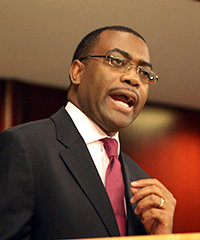The Board of the African Development Bank (AfDB) has approved the sum of $600 million to support the Nigerian economic governance.
This was revealed by the president of the bank and former minister of agriculture, Dr Akinwumi Adesina while fielding questions from journalists at the 11th African Economic Conference which started in Abuja on Monday with the theme: Feed Africa, Towards Agro Allied Industrialization for Inclusive Growth, jointly organised by the AfDB , the United Nations Economic Commission for Africa(UNECA) and the United Nations Development Programme(UNDP).
Reacting to a question on the support of the bank in coming out of the current recession, Akinwumi said “As far as the AfDB is concerned we had said that we are going to consider a billion dollars to support Nigeria when I visited the President and already that has gone to the board and 600million dollars has been approved by our board just a month ago for Nigeria to support its economic governance.”
According to Adesina, “That amount of money is going to help in many ways to stabilises the naira. It is also going to help the government to support very much needed reforms in the agricultural sector in terms of different agricultural policy reforms but also in the energy sector that are very fundamental to how you grow the economy and come out of recession.”
He said on the the issue of coming out of recession for Nigeria, “we will finance huge amount of support to the private sector, adding that the AfDB continues to make significant amount of support in the private sector, they are investing in banks, we are giving them quite a lot of financial support trying to keep them afloat in this very tough period.”
The president, however, noted that in coming out of recession, Nigeria will also require some tough policy decisions. He said “I think the government has taken some tough policy decisions, noting that when the price of petroleum collapsed, the price of subsidy was removed, the naira was also allowed to devalue.”
He noted that there is still a problem with regards to the Forex market “There is still a number of issues to be sorted out, we got to have the monitory policy and the fiscal policy regime sorted out so as to be able to stabilise the naira, provide sufficient amount of access to foreign exchange for Forex for those that want to bring in machinery equipment or materials.”
He was optimistic that as these policy instruments are sorted out, Nigeria should be in a good position to significantly attract some amount of foreign direct investment, which it needs.
“But at the end of the day, if a bird is flying, it always uses two wings, there is the public side and the private sector side, it is very important for Nigeria to incentivise its way out of the recession, to give a lot more incentives for the private sector, attract significant amount of foreign direct investment, especially in critical sectors such as agriculture, mining and the industrial manufacturing sector.”
Adesina while noting that recession in Nigeria is due to an estrogenic shock in the sense that the price of oil had gone down stated that, Nigeria is not the only country in recession but rather all oil exporting countries that depend for the greater share of their revenue in foreign exchange earnings.
In the case of Nigeria, it’s really a revenue concentration problem, in the sense that the oil sector accounts for only about 10% of the GDP, but accounts for however 70% of government revenue and over 90% of government foreign exchange earnings and therefore when you have a decline in the price of oil it affects every single thing in the economy.
He assured that “The AfDB is putting efforts with other multinational multilateral financial institutions to be able to provide robust support for Niger. The AfDB is working with the World Bank, the IMF and others to see how best we can foot a whole string of instruments to support Nigeria” he said.
The president said the AEC is focussed on agro industrialisation, no part of the world has ever been industrialised without actually undergoing agro industrialisation, so this meeting is basically to look at those issues, are they issues of investments and infrastructures, finance, political and economic issues or global, or regional value chains issues of agriculture that we need to pay attention to.
Also speaking, United Nations Assistant Secretary-General and UNDP Assistant Administrator and Regional Director for Africa, Abdoulaye Mar Dieye said African economies are still largely agrarian; contributing close to one-fifth of GDP, and accounting for seven out of ten people employed in countries on the continent.
He posited that three main factors accounted for African agriculture’s under-performance and low productivity which includes that a large proportion of Africa’s agriculture depends on rain as only 6 percent of the total cultivated area in Africa is equipped for irrigation, slow growth in productivity, which currently accounts for one-third of the world average and the urban-biased development policies exacerbate rural poverty which leads to rural-urban migration, increased urban informal economies, and urban poverty.
As a way forward, the Development Expert advised that “Countries must invest more and strategically in order to escape the low productivity trap by increasing investment in agriculture, use agriculture to power industrialization, foster regional integration and as well as recognise the fact that Africa must focus attention on agro-allied industrialization that is inclusive and leaves no one behind.
Copyright Ships & Ports Ltd. Permission to use quotations from this article is granted subject to appropriate credit given to www.shipsandports.com.ng as the source.

